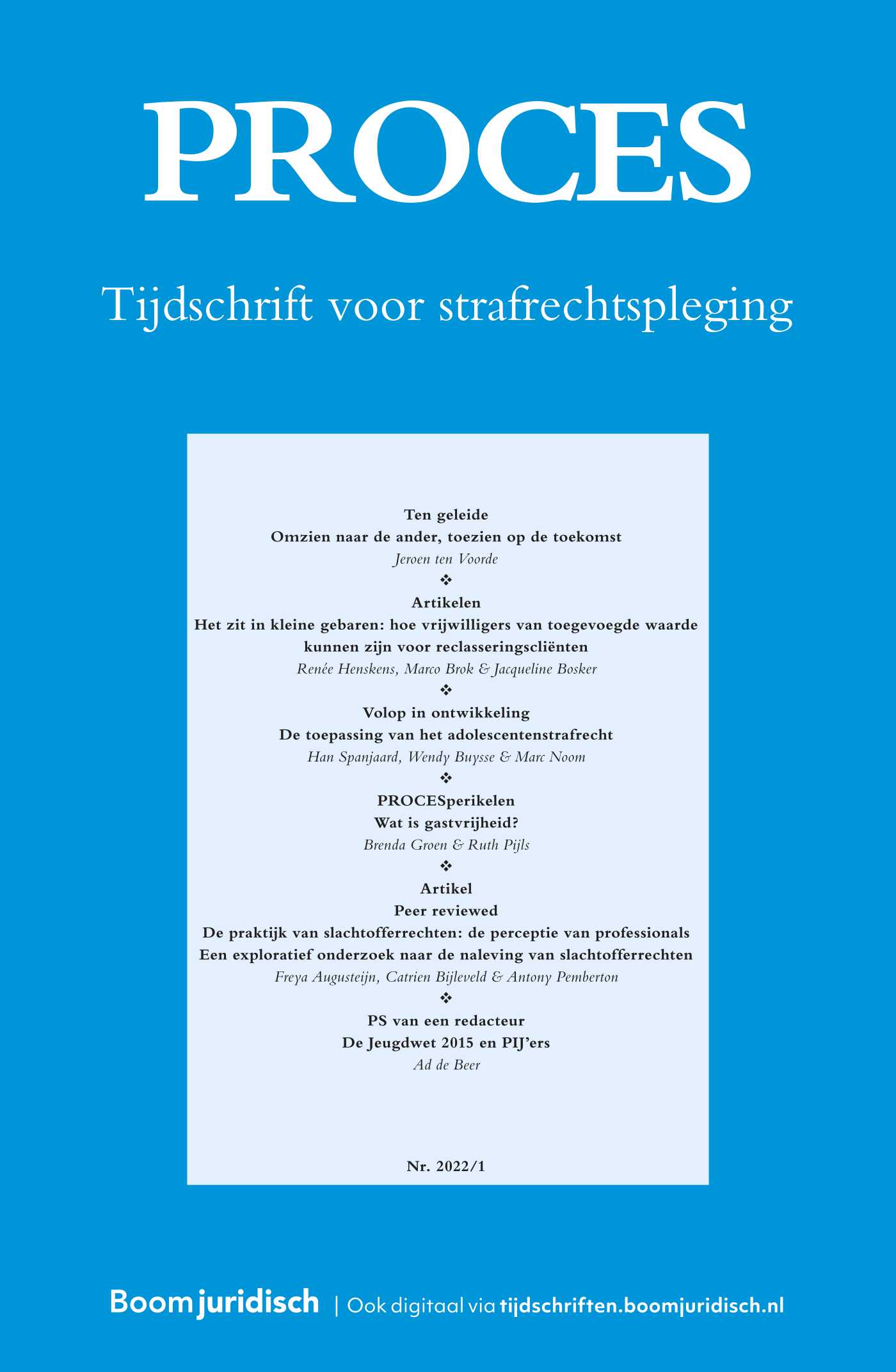|
This editorial offers an introduction to the current issue. |


PROCES
Meer op het gebied van Criminologie en veiligheid
Over dit tijdschriftMeld u zich hier aan voor de attendering op dit tijdschrift zodat u direct een mail ontvangt als er een nieuw digitaal nummer is verschenen en u de artikelen online kunt lezen.
| Redactioneel |
‘De’ publieke opinie? |
| Trefwoorden | editorial, public opinion |
| Auteurs | Mr. dr. drs. Maartje van der Woude |
| SamenvattingAuteursinformatie |
| Artikel |
Minimumstraffen en de dovemansoren van de wetgever |
| Trefwoorden | minimum sentences, sentencing goals, retribution, penal populism |
| Auteurs | Sigrid van Wingerden |
| SamenvattingAuteursinformatie |
|
Early this year, a bill was introduced proposing mandatory minimum sentences in the Netherlands. Despite harsh criticism from within the legal complex, the bill has not been withdrawn, instead its scope has been broadened. This article states that the reasons given for the introduction of mandatory minimum sentences have no empirical foundation and that the objectives of the bill will not be reached: mandatory minimum sentences will not contribute to the prevention of crime. The reason for the introduction of the bill is nothing less than a textbook example of penal populism. |
| Artikel |
Door een gekleurde bril?Bespreking van een verkennend onderzoek naar de percepties en ervaringen van allochtone en autochtone jongeren ten aanzien van oneigenlijk selectief politiewerk |
| Trefwoorden | racial profiling, actuarial justice, discretionairy powers, police |
| Auteurs | Mr. dr. drs. Maartje van der Woude, Prof. dr. Joanne van der Leun, Fleur van Barneveld e.a. |
| SamenvattingAuteursinformatie |
|
By expanding preventive powers, the Dutch criminal justice system is increasingly aimed at detecting risky people and groups as soon as possible. This so-called actuarial justice is accompanied by a great deal of discretionary power in the hands of those who have to enforce the law, bearing the risk that such powers may be carried out (in part) on the basis of generalizations relating to race, ethnicity, religion or nationality instead of on the basis of individual behavior and/or objective evidence. By presenting the results of an exploratory study into the perceptions of minorities with regard to racial profiling, the main conclusion of this article is that there is a clear necessity for further empirical research into this area. |
| Praktijk |
‘Ik heb zeven petten op’Wie is de cliënt van het forensisch maatschappelijk werk? |
| Auteurs | Swanny Kremer |
| Auteursinformatie |
| Artikel |
Slachtoffers van loverboys als daders bij de reclassering |
| Trefwoorden | loverboys, probation service, human trafficking |
| Auteurs | Damiaan van den Eijnden |
| SamenvattingAuteursinformatie |
|
One of the defining characteristics of so-called ‘loverboys’ is their exploitation of victims in any possible way, including forcing these exploited women to commit crimes. In this way, victims become criminal offenders. After a critical review of the use of the term ‘loverboy’, the first part of this article discusses the responsibility of the Dutch probation service in addressing the problem. The second part describes various ways in which probation officers come into contact with this particular group of offenders and how this contact could then be maintained. |
| Column |
Ik was op de terugweg |
| Trefwoorden | column |
| Auteurs | Ad de Beer |
| SamenvattingAuteursinformatie |
|
|
